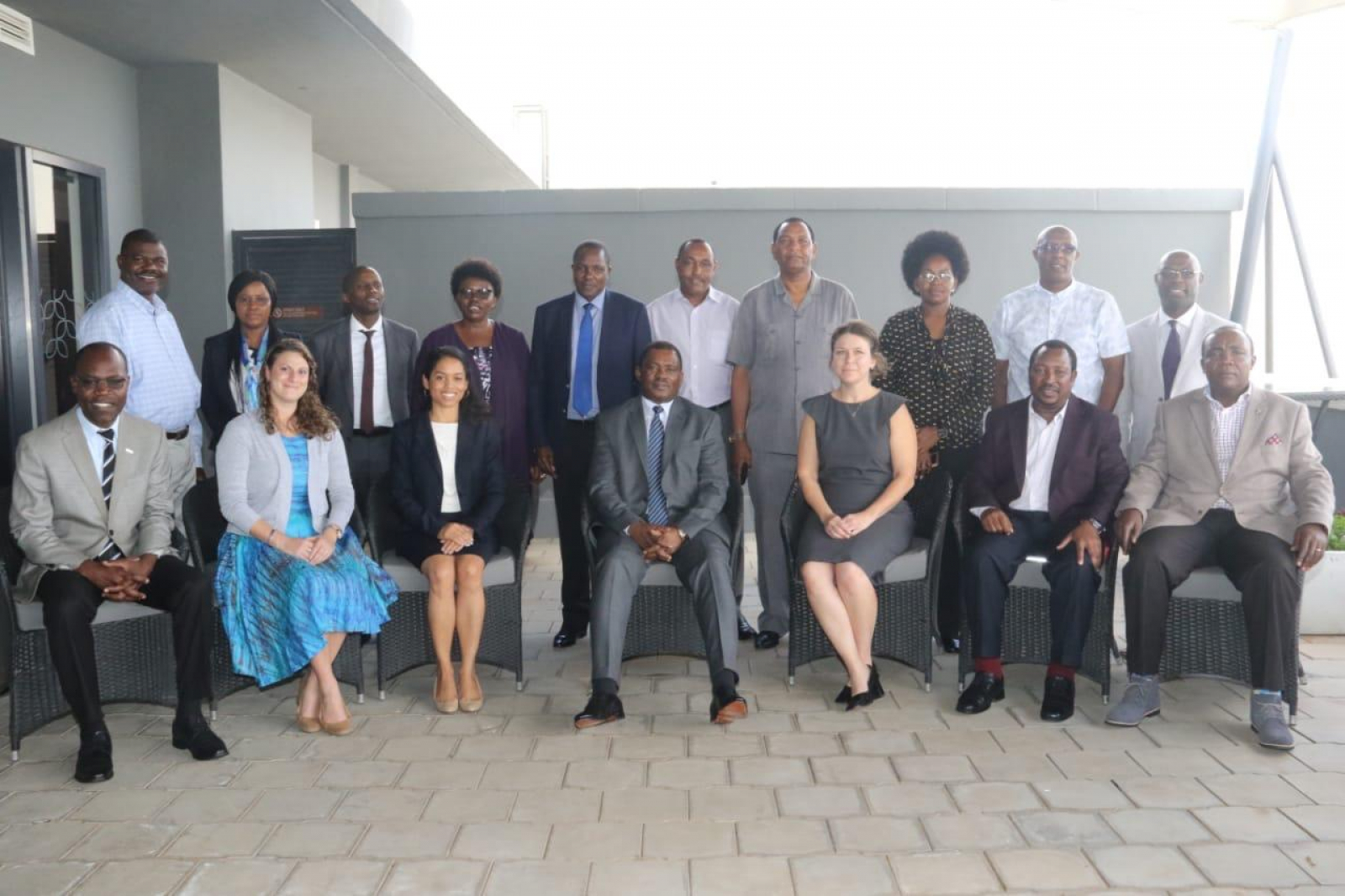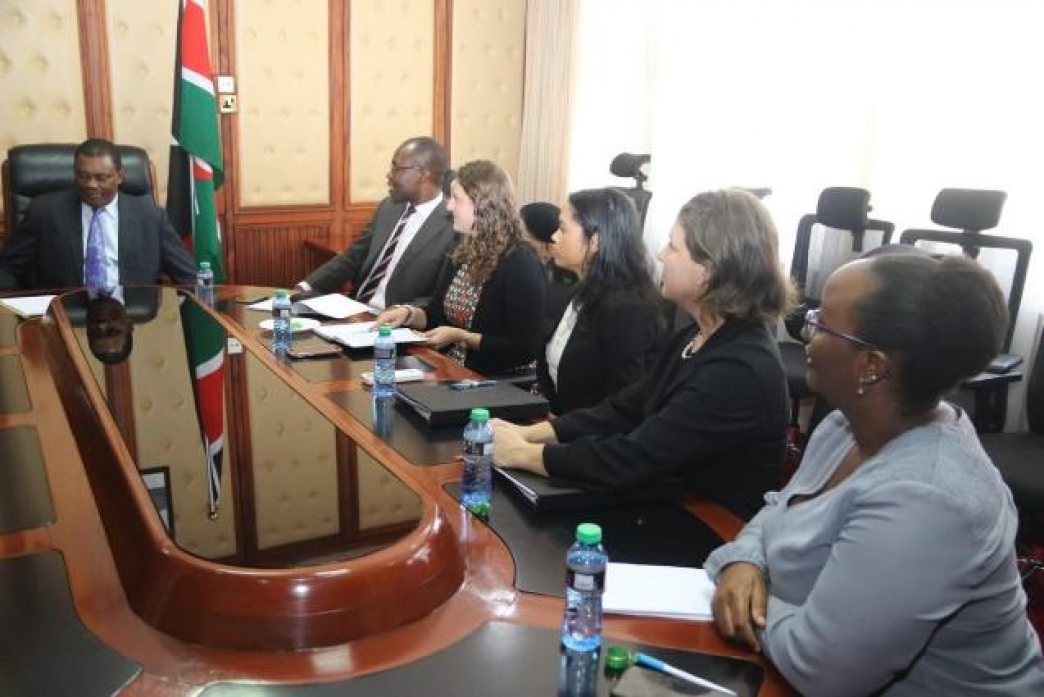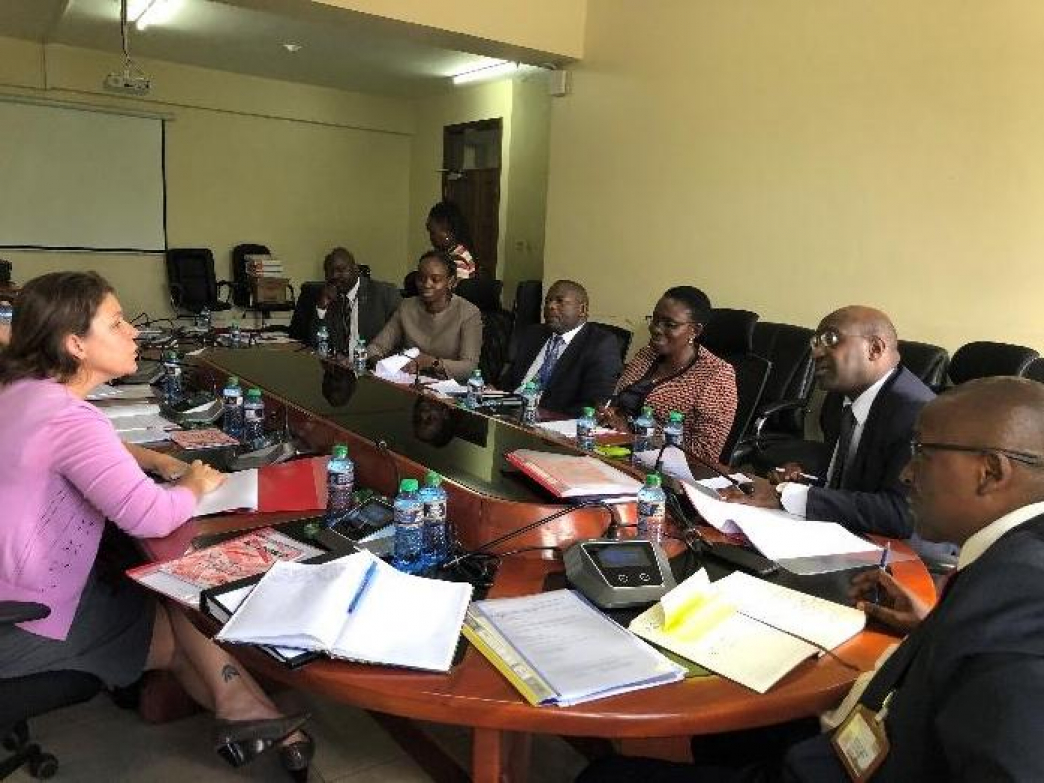
Speaker of the Kenya National Assembly Hon. Justin Muturi, members of the House Powers and Privileges Committee, former U.S. House Ethics Committee experts, and NDI staff pose for a photo taken during HDP training with Powers and Privileges Committee on November 9, 2019.
SHARE
In 2017, Kenya passed the Powers and Privileges Act, a landmark law that established a code of conduct for members through the oversight of a legislative Powers and Privileges Committee. Since then, under the leadership of Speaker Justin Muturi, the National Assembly has worked to codify practices on ethics and integrity measures for members and staff of the institution. Ethics frameworks promote the integrity of the legislative institution by ensuring members and staff do not exploit their position for personal advantage. Last year, following a new member of parliament orientation, which included a discussion on the importance of ethics and integrity measures for parliamentarians, the speaker requested assistance from the House Democracy Partnership (HDP) to bring high-level experts to Kenya to support compliance and the further development of such measures.
HDP – a bipartisan 20-member commission of the U.S. House of Representatives that supports peer-to-peer engagements between global parliamentary peers on initiatives related to legislative independence, capacity, and oversight – was well-positioned to answer the Speaker Muturi’s request. HDP is funded by the U.S. Agency for International Development through a cooperative agreement called the Consortium for Elections and Political Processes with the International Republican Institute, in which both institutes collaborate with the U.S. House of Representatives to support good practices in legislative capacity with more than 21 partner legislatures around the globe.
Former U.S. House Ethics Committee staff and NDI staff attend a meeting with Speaker of the Kenya National Assembly Hon. Justin Muturi. Photo taken on November 6, 2019.

Former U.S. House Ethics Committee experts speaking with members of the Parliamentary Service Ethics and Integrity Committee, which is comprised of expert parliamentary staff. Photo taken on November 7, 2019.

In November, two former U.S. House Ethics Committee counsels traveled to Nairobi to work with parliamentary stakeholders on the development and implementation of ethics and integrity measures for members and staff. Over the three-day HDP exchange, which was facilitated by NDI, the counsels worked with a range of partners, including the speaker, staff and members of the Powers and Privileges Committee, as well as the Parliamentary Service Ethics and Integrity Committee.
“I could not have asked for better,” Speaker Muturi explained following the visit of the HDP counsels.
With the goal of gaining the building blocks to ensure good ethics and integrity practices in the National Assembly, the speaker provided praise for the opportunity to engage with peer experts on these critical issues. The training delved into a wide array of topics, including:
- the evolution of U.S. ethics laws for government officials;
- mechanisms for handling incoming inquiries and information on the U.S. House Ethics Committee and in the Office of Congressional Ethics;
- training and education on ethics procedures for members of Congress and staff;
- financial disclosure requirements for members and senior legislative staff; and
- ethics requirements around lobbying.
The training also provided an opportunity for participants to exchange ideas on ethics procedures and practices between the two countries. For example, one MP asked whether the mandate of the Powers and Privileges Committee is “selected, insulated, and passionate enough” to fulfill parliament’s ethics mandate, especially when compared to the various ethics and administrative frameworks across the U.S. House of Representatives and within U.S. law. In response to the consultants’ presentations, the Speaker Muturi discussed whether it would make sense to establish a standalone ethics committee that addresses issues of bribery and financial disclosures, going beyond just member decorum and institutional processes, which are currently handled by the Powers and Privileges Committee.
One consultant made clear that the goal of an ethics committee is to “bring members into compliance,” and that ethics and integrity measures are not just about expectations for how members should act on the House Floor, but also about how members are expected to uphold their oath of office in protecting the integrity of the institution on behalf of the people.
Another key issue raised was the fact that ethics processes evolve over time. “The U.S. structure took over 200 years to establish, and we are still working on it,” said one consultant. “Kenya’s frameworks are a lot further along than the U.S. was when we started these discussions.”
Unlike in Kenya, the U.S. speaker of the House of Representatives does not chair committees in order to ensure the speaker’s impartiality to the institution. Speaker Muturi expressed interest in adopting this policy in the Powers and Privileges Committee, which the rules currently stipulate he chair, and other U.S. ethics policies around gifts, official travel, and lobbying.
At the end of the training, the committee agreed upon several action items that would be deliberated by the full committee for eventual discussion before the National Assembly. These items included the following:
- Establish a training regimen for all members on ethics and integrity measures, including the development of a comprehensive manual outlining ethics measures for MPs
- Clarify the role of external government offices focused on ethics and integrity, and streamline the many ethics and integrity policies that exist both within the Kenyan Constitution, in parliamentary rules, and in overall state law
- Consider policies on financial disclosures, travel, and gifts
- Consider the creation of a formal committee on ethics
- Rethink the requirement of the speaker to chair the Committee on Powers and Privileges
Additionally, the Committee discussed the need to adopt frameworks that clarify lobbying practices, and potentially take up discussion on a draft bill outlining lobbying measures as proposed by the Justice and Legal Services Committee.
In the weeks since the exchange, the Powers and Privileges Committee has already proposed amendments that would establish a formal ethics committee, and designate a member (rather than the speaker) as chair of the Powers and Privileges Committee. The efforts of the House Democracy Partnership visit are already proving to be transformative, working to strengthen the integrity of the institution at a critical moment in time.
Author: Frieda L. Arenos is a Senior Program Manager with the Governance team at the National Democratic Institute.


